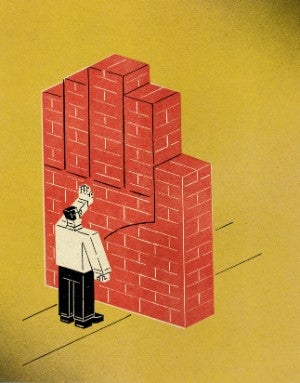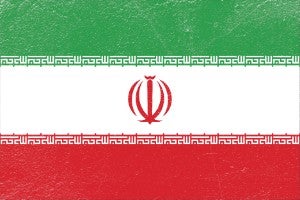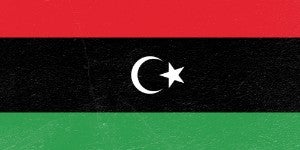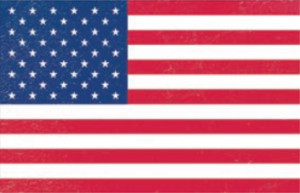LENS Dispatch
Shock and Solidarity
Our Campus Grapples with White House Travel Ban
 IMAGE: David Plunkert / Theispot
IMAGE: David Plunkert / TheispotAfter a judge in Honolulu blocked President Donald Trump's travel ban in March, a Case Western Reserve University law student from Libya flew his fiancée to Chicago for a hastily arranged wedding, abandoning plans for a ceremony in their native country.
In countless and essential ways, the temporary ban on travel from some predominantly Muslim countries altered the lives and outlooks of many people at the university, where nearly 20 percent of students come from outside the United States.
The order came out late on the afternoon of Friday, Jan. 27, and university leadership worked through the weekend to respond. President Barbara R. Snyder and Provost W.A. "Bud" Baeslack III sent campus emails on both Saturday and Sunday, writing that the president's action was "antithetical to our core values."
"… the order has created enormous uncertainty for those from the predominantly Muslim nations the order affects," they wrote. "To all of you, we express our deepest regret for the fear and worry you are experiencing right now. Please know that we at Case Western Reserve will do all that we can to provide you information, assistance and support as you deal with this development and its impacts."
That Monday, more than 250 people came to a campus informational meeting that overflowed with support. Before it began, a group gathered outside with signs stating, "All Are Welcome Here." The greeters were organized that morning by Ian Charnas (CWR '05), manager of the university's Larry Sears and Sally Zlotnick Sears think[box] innovation hub.
In the spring, Case Western Reserve joined several other leading national universities in filing appellate briefs supporting legal challenges to the ban.
In midsummer, nearly 1,300 representatives from 86 countries came to campus for an international admissions conference that Vice President for Enrollment Management Richard Bischoff said made the university "an ambassador for higher education in the international community."
And in late September, the president issued a new travel ban. The U.S. Supreme Court then canceled a session to hear arguments over the earlier orders and asked for briefs related to the new development.
Meanwhile, members of Case Western Reserve's international community face new questions about the travel restrictions, and university staff work to help them.
Some of their stories follow.
For updates and university guidance on the travel ban, visit case.edu/executive-order-updates/
Dispatches from the Front Lines

FRIDAY, JAN. 27
At 4:39 p.m., President Donald Trump signed Executive Order No. 13769, imposing a temporary "travel ban" on refugees and individuals from seven predominantly Muslim countries: Iran, Iraq, Libya, Somalia, Sudan, Syria and Yemen.
"I was at home [not far from campus] having my dinner when I saw the news alerts start coming onto my phone screen. I felt sick. I stopped eating and did not sleep for 24 hours. I had a panic attack, really. My husband was still in Tehran. I had no idea whether I could ever go back to him or he could come to me, although eventually he did make it here … this spring. He has been told that if he returns he could face a trial and be put in jail because he is a journalist. So he cannot go back, and I do not want to go back because my home is also a country where I cannot progress in my career as I thought I could here. So now we no longer feel like we are welcome in either country—our home or where we now live in the United States.
"And I just found out that I am pregnant, so our baby will be born here in America. Everything has changed because of that day [Trump issued the order]."
—A CASE SCHOOL OF ENGINEERING POSTDOCTORAL ASSOCIATE FROM IRAN

MONDAY, JAN. 30
The university quickly organizes a meeting at the Ford Auditorium on campus to provide information and support.
"Between 250 and 350 people attended—students from the affected countries, faculty from affected countries and many others from around the university.
"One moment particularly moved me and, I believe, everyone in the room. A student stood up. She said she was from Iran and graduating in May. She had not seen her parents in two years, but said they were scheduled to come to her graduation. Now, because of the ban, she said they would not be able to come—and she started crying. "In that moment, we all understood the real pain caused by the ban. The outpouring of support for the woman—and for all who were affected—was remarkable. People came to the meeting to stand up and say, 'We are a community that is coming together to fight against this executive order.' We banded together to support international students, faculty and staff generally, and those from the countries named in the order specifically, and to let all those affected know that they are a vital part of the university community."
—DAVID FLESHLER, VICE PROVOST FOR INTERNATIONAL AFFAIRS AND CO-LEADER OF THE SESSION

FRIDAY, FEB. 3
U.S. District Judge James L. Robart in Seattle blocks the Trump administration's order nationwide.
"I was relieved somewhat because of the ruling, but also because of how the law school community helped me. One professor even said, 'I will defend you free of charge.'
"But at the same time, I was still bothered because I was very interested in the history of United States and the civil rights movement here. I came here wanting to know how can I use the Founding Fathers' thoughts to make something good, to help people, and suddenly I was faced with this painful thing.
"I do appreciate that Americans care about their national security. I suffered from terrorism in Syria and don't want anyone to suffer from terrorism. I didn't do anything wrong, but just by executive order I was classified as if I am suddenly a dangerous person to the society where I live."
—A SCHOOL OF LAW STUDENT FROM SYRIA

WEDNESDAY, MARCH 15
U.S. District Judge Derrick K. Watson in Honolulu blocks the president's revised travel ban covering six countries before it takes effect. (The administration had removed Iraq from the list, but kept the other countries on it.)
"I believed [Watson's ruling] was a signal that the American system works, and now the whole world could see that even a foreign student, a person who has not been here very long, has rights, too. Before that … I felt frustrated by the ban and it made my options really hard. I felt pressure to go back to my family and my fiancée to get married in Libya. But I felt the pressure to stay and finish my education because I had the fear that I might not be able to get back into the United States if I left.
"And then the court action gave me hope and also helped me find an answer. I called my family in Libya and they approached the family of my wife [then fiancée] to hurry up and do the marriage contract.
"They arranged it quickly, emailed a PDF for me to sign and we moved up the wedding to April 8. My fiancée and her brother flew from Tripoli to Jordan, where they got visas to come to the United States. We got married in Chicago, and some people from the Libyan communities in Chicago and Toledo came. When you make something possible that seemed so hard, you feel strong and satisfied. But no one else from our families could come because, for many reasons, it is extremely difficult for Libyans to get visas."
—A LAW SCHOOL STUDENT FROM LIBYA

LATE SPRING
Undergraduate students are accepting admission into Case Western Reserve.
"The fact is, it is now tougher than ever to convince people to come to the U.S. for undergraduate studies, even if just because of the fear that they could be impacted. "Our numbers didn't drop dramatically, but I know of one student who wanted to come here to Case Western Reserve, but opted to go to college outside of the United States. I think he ended up enrolling at a university in Canada because he was not convinced he could get a visa to come here from Iran. "So, while the numbers may seem small, there is now a strong international perception that the U.S. is just not friendly to other countries, to other cultures."
—RICHARD BISCHOFF, VICE PRESIDENT OF ENROLLMENT MANAGEMENT

MIDSUMMER
Thousands of students have left campus; a limited number remain.
"I didn't go home this spring or summer for fear I wouldn't be able to return to the U.S., even though Lebanon isn't on the banned list. I've always had some difficulties traveling because even though I was born and raised in Lebanon, I'm considered a Palestinian refugee because my father's documentation says that. When I first heard about the ban, it was a huge shock and disappointing— the kind of reality check that changes your life, changes your identity. Until now, like every other international student, I really believed in the American dream—that I could work here long enough, get a full education, then citizenship, and contribute back to society here and then in my home country. Now, because I think more troubles are coming, I'll just try to finish and go somewhere else—maybe Canada—for the schooling I need to be able to become a psychotherapist and go back to the refugee camps and help people."
—A COLLEGE OF ARTS AND SCIENCES UNDERGRADUATE FROM LEBANON
MONDAY, JUNE 26
The U.S. Supreme Court temporarily permits a limited version of the revised ban, allowing entry for people who have a "bona fide" relationship in the United States.

TUESDAY THROUGH FRIDAY, JULY 11-14
The university hosts the annual conference of the International Association for College Admission Counseling, which drew admission counselors and college advisors from 86 countries.
"It was so powerful for an entire week to have 1,300 people on this campus who share a belief in the transformative power of education around the world. The conference came … after the Supreme Court upheld part of the ban, so people were talking about that a lot. Because we were the hosts for this collection of people, we became the stage for all those conversations. … [A]t the same time, we were the center for hope for the change that education can bring."
—ROBERT R. MCCULLOUGH, ASSISTANT VICE PRESIDENT FOR ENROLLMENT, DIRECTOR OF UNDERGRADUATE ADMISSION





